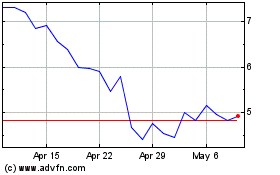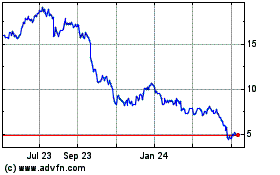By Nora Naughton, Matt Wirz and Cara Lombardo
Years before it was forced into bankruptcy, Hertz Global
Holdings Inc. decided to replace a fleet that was becoming a
turnoff to customers.
Because Hertz was strapped, it bought what was cheap and
available, doubling down on sedans instead of the SUVs customers
wanted. "The fleet had aged to the point that we had customer
mutiny," said former Hertz Chief Executive John Tague. "We were
solving the biggest problem, but not solving all the problems."
That decision was emblematic of a series of strategic missteps
and other blunders that kept Hertz behind competitors and buried
under debt. The downturn caused by the coronavirus was just the
icing on the cake. Hertz on Friday filed for bankruptcy
protection.
The pandemic's economic fallout has triggered a wave of
bankruptcies, including chapter 11 filings in recent weeks by
energy companies and retailers such as J.C. Penney Co. and Neiman
Marcus Group Inc. It has pushed more-stable companies to preserve
cash and go deeper into debt to shore up liquidity.
In many cases, the companies in the most trouble today are those
who were also in the most trouble yesterday. The pandemic means
muddling through is no longer an option.
The crisis has battered the whole rental-car industry with a
plunge in bookings. Hertz was more vulnerable than competitors,
having borrowed about $19 billion directly and through a series of
complex financial transactions. In addition to its sedan
commitment, the company was held back by its troubled 2012
acquisition of Dollar Thrifty and efforts to move into the
leisure-traveler market, a niche dominated by Avis Budget Group
Inc. and Enterprise Holdings Inc.
Hertz's collapse is among the highest-profile corporate defaults
from the pandemic's impact on air and ground travel. "All the money
spent on overpriced mergers and acquisition, the questionable fleet
management," said Glenn Reynolds, co-founder of research firm
CreditSights, who has covered Hertz for more than two decades, "it
caught up with them."
Hertz was already struggling to fend off threats to its business
from Uber Technologies Inc., Lyft Inc. and other ride-hailing
firms. And its better-capitalized rivals, Avis and Enterprise,
moved faster to update technology, refresh their fleets and
rebalance offerings with SUVs, analysts and former Hertz executives
said.
At its 2014 peak, Hertz's market value was above $14 billion,
about twice Avis's. It hovered around $2 billion for the past few
years until the threat of bankruptcy sent it below $500 million,
while Avis's market value stands around $1 billion.
"With the severity of the COVID-19 impact on our business, and
the uncertainty of when travel and the economy will rebound," Hertz
CEO Paul Stone said in a written statement late Friday of the
bankruptcy filing, "we need to take further steps to weather a
potentially prolonged recovery."
Hertz has cycled through four CEOs in less than a decade. The
latest change came this month when Kathryn Marinello, its CEO for
three years, clashed with her board over corporate strategy,
according to people familiar with the matter. and was replaced by
Mr. Stone, who recently ran Hertz's retail operations for North
America.
The 102-year-old company began as a fleet of 12 Ford Model-Ts in
Chicago and helped pioneer the rental-car business. It was
originally known as Rent-a-Car Inc. By the 1970s, Hertz was a
household name. With its airport counters and yellow logo, it was
the go-to for a reliable base of business travelers.
It went through owners including RCA Corp. and Ford Motor Co.,
which sold it in 2005 to a group of private-equity firms led by
Clayton Dubilier & Rice for $5.6 billion. The transaction
saddled the company with more debt. A year later, the sold out
their investment via an initial public offering.
By 2010, with the economy rebounding from the financial crisis,
then-CEO Mark Frissora, who led the company through the downturn,
decided to expand into the market for leisure travelers. After a
two-year pursuit and a bidding war with Avis, it acquired Dollar
Thrifty Automotive Group, which specialized in tourism and rentals
covered by auto insurers, for more than $2 billion.
To pay for the deal, Hertz borrowed heavily in bond markets,
increasing its corporate debt by about 50% to $6 billion, financial
filings show. Integrating the companies was fraught, not only
failing to deliver promised savings but also costing it money,
analysts, investors and former executives said.
'Lot of confusion'
"There seemed to be a lot of confusion on everything from
pricing to fleets to locations," said Michael McDowell, a former
longtime Hertz manager who worked in e-commerce for the company
until early 2019. "It was a big distraction trying to figure out
how to put it all together, much more than anyone imagined."
Mr. Frissora stands by the move to acquire Dollar Thrifty, his
spokesman said.
Toward the end of Mr. Frissora's tenure, Hertz made another
major change: It decided to hold on to the company's rental
vehicles longer, hoping to extend their life cycle by putting them
in discount-brand fleets as they aged. This move also delayed the
vehicle depreciation and gave a temporary bump to Hertz's financial
results, analysts said.
The change backfired. Customers complained about the condition
of the fleet's older vehicles, and many defected to Avis, analysts
and investors said.
After the debt-fueled Dollar Thrifty acquisition, Hertz had
little capacity to borrow, so it turned to one of the more arcane
corners of Wall Street, the market for asset-backed
securitizations, or ABS, which was reviving from a long hibernation
after the 2008 credit crisis.
Investment banks created financial trusts for Hertz to issue
bonds that bought vehicles, which were leased back to the company.
The bonds had much lower interest rates than Hertz could borrow at
because they were backed by the cars and had high credit
ratings.
Activist investor Carl Icahn disclosed a large position in
Hertz's stock in August 2014. Its share price, though around what
would be its peak, had been dented by accounting irregularities.
Mr. Icahn pressed for a change in management, citing the accounting
and operational problems.
Mr. Frissora stepped down in September 2014. In 2015, Hertz
restated three years of earnings, which it later said cost it $200
million. The Securities and Exchange Commission fined Hertz, which
didn't admit wrongdoing, and the company later sued Mr. Frissora
and other executives to claw back millions of dollars in
compensation from them tied to the accounting. The case is
pending.
Mr. Frissora, now a private-equity adviser, through his
spokesman denied wrongdoing. The spokesman said Mr. Frissora
presided over operational improvements and blamed Hertz's decline
on the executive churn following Mr. Fissora's departure.
As part of a settlement agreement to avoid a proxy fight, Hertz
gave board seats to three of Mr. Icahn's representatives, who
helped recruit Mr. Tague as CEO. When Mr. Tague stepped in at the
end of 2014, Hertz's rental-car fleet had aged significantly and
the company had lost at least three quarters of its staff in moving
its headquarters from New Jersey to Florida, according to analysts'
estimates.
Mr. Frissora's spokesman said the move was part of the
then-CEO's plan for integrating Hertz with Dollar Thrifty, and that
it made economic sense at the time.
Mr. Tague, now a private-equity adviser, said he felt the move
was a distraction, as he had trouble recruiting a new staff and
lost institutional knowledge. A former United Airlines Inc.
executive, Mr. Tague said he spent much of his tenure fixing
operational problems including the company's fleet while hoping to
lift results by applying an airline-like approach to pricing, where
customers paid a lower price for the rental car but extra for
add-ons.
Mr. Tague's efforts didn't impress investors, and he disagreed
with Mr. Icahn on how to prioritize the threat of ride-hailing
firms like Uber and Lyft, he acknowledged.
"I believed that our greatest threats were internal," Mr. Tague
said. "We had to address those before we got to the external
threats."
Aggressive borrowing
Hertz continued aggressively borrowing in the asset-backed
securities market, issuing riskier bonds to raise more money per
car starting in 2015. Its traditional rating firm, Moody's
Investors Service, didn't rate the new "Class D" bonds highly
enough, and Hertz turned to a competing firm, Fitch Ratings, to
rate the debt instead, a former banker who worked on Hertz ABS
deals said.
By the time Ms. Marinello took over in 2017, the company had
$13.5 billion of debt and was falling further behind on technology.
As more customers were opting for SUVs, Hertz had too many
fast-depreciating sedans it needed to sell. She executed a
turnaround plan aiming to take Hertz "back to basics" and pushed to
work with ride-hailing companies.
Hertz under Ms. Marinello continued to lean on asset-backed debt
to fuel growth, increasing ABS borrowing by about 40% to $14.4
billion over the past two years, according to financial
filings.
By early 2020, after four straight years of net losses, Hertz
saw revenue increase 6% in the first two months of the year.
But as the virus outbreak grounded thousands of flights and
travel lockdowns became widespread in mid-March, the company found
itself in survival mode and laid off 10,000 employees in North
America.
Hertz's undoing, in the end, wasn't only the pandemic but also
its dependence on financial engineering: In April, it faced a
roughly $500 million payment to ABS bondholders, a figure that
ballooned as used-car values dropped. It had about $1 billion in
cash on its books, and its board faced a choice: Preserve cash or
pay.
Ms. Marinello favored making a significant partial payment,
which she believed would appease creditors and avoid bankruptcy,
said people familiar with the matter. The board argued it was
better to negotiate with creditors and stockpile cash for a
prolonged dry spell, these people said. Ms. Marinello was
outnumbered, some of the people said.
On Thursday afternoon, there was still hope a deal might be
struck to give the company more time, these people said. By midday
Friday, the prospect faded when the top lenders wouldn't budge:
Hertz's operations were losing more than $200 million a month,
before having to make lease payments of roughly twice that, the
people said.
Around 10 p.m. Friday, Hertz filed for bankruptcy without a
clear plan with creditors in place -- a rare move for a company of
its size.
Since equity holders rarely survive a bankruptcy, Mr. Icahn, who
owns nearly 40% of Hertz, is expected to lose his entire roughly
$1.5 billion investment. That includes more than $200 million of
new shares bought last summer to help it pay down debt. People
familiar with the matter said he might not be entirely done with
the investment. He could invest further as the company emerges from
bankruptcy.
--Alexander Gladstone contributed to this article.
Write to Matt Wirz at matthieu.wirz@wsj.com and Cara Lombardo at
cara.lombardo@wsj.com
(END) Dow Jones Newswires
May 25, 2020 15:38 ET (19:38 GMT)
Copyright (c) 2020 Dow Jones & Company, Inc.
Hertz Global (NASDAQ:HTZ)
Historical Stock Chart
From Mar 2024 to Apr 2024

Hertz Global (NASDAQ:HTZ)
Historical Stock Chart
From Apr 2023 to Apr 2024
